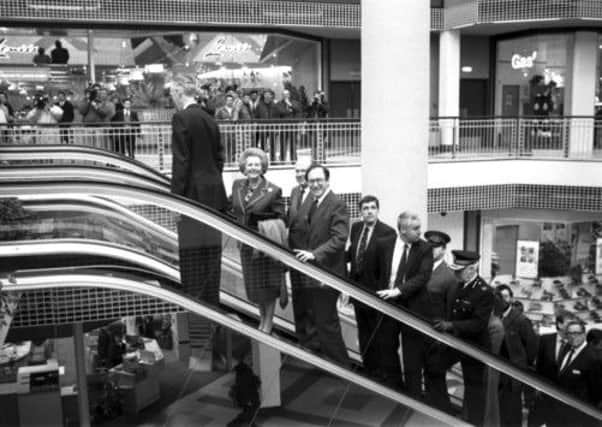Book review: Margaret Thatcher: The Authorized Biography, Vol 1, Charles Moore


Margaret Thatcher: The Authorized Biography, Vol 1
Charles Moore
Allen Lane, £30
WHEN I was first asked to write this review of Charles Moore’s new biography of Margaret Thatcher I was slightly daunted at the prospect of having first to read the 758 pages of what is only Volume 1. What that is new would I find there? Has not her life already been endlessly recorded in countless books, films and documentaries?
I need not have feared. Moore’s biography is, in fact, outstanding. Not only is he the first biographer to have had unrestricted access to her personal papers and every surviving private letter written by her, he also approaches each historical event with which she was involved as an opportunity to understand better her personality, beliefs, fears and prejudices.
Advertisement
Hide AdDespite being a strong admirer of the Iron Lady, Moore does not allow this to deter him from the severest criticism of her wherever her actions did not live up to her words or her motives and behaviour fell severely below the standards she expected from others. The most fascinating revelations are those of her early love life in her teens and 20s. The many letters she sent at that time to her elder sister Muriel reveal a young woman who was serious and energetic, but with the normal preoccupations of clothes, her own appearance, and boyfriends.
She was charming and considerate to a series of these young men but, in her treatment of one of them, we can see that extraordinary blend of personal kindness and imaginative ruthlessness that was to be her hallmark as Prime Minister. He was a young farmer, Willie Cullen, whose family had migrated south from Scotland. She was very fond of him, and he was very keen on her. But she decided she did not wish to spend the rest of her life as a farmer’s wife in East Anglia. Practical as ever, however, and loath to waste a valuable asset, she invited her unmarried sister, Muriel, down to Colchester and arranged for the amiable Willie to meet her. Her plan worked and they were happily married for over 40 years.
Thatcher had a deserved reputation for mastering complex issues and demonstrating an unrivalled attention to detail, but she combined this with a curious naivety and endearing innocence on matters off her personal radar screen.
Her recommendation that all prime ministers “need a Willy”, without understanding why her reference to Lord Whitelaw brought howls of laughter, is well known. Moore reveals an equally delightful example.
She was informed of a Tory win in a by-election while she was doing a television interview. To demonstrate her delight she gave what she believed to be a Churchill V for victory sign in front of the cameras. Inadvertently, she did it the wrong way round thus transforming it into what is universally recognised as an obscene gesture.
I had a similar experience with her when I was Secretary of State for Scotland. Briefing her before a lengthy TV interview, I encouraged her to stop using the phrase “You in Scotland” as it emphasised her Englishness and could be misunderstood. She assured me that she had taken the point.
Advertisement
Hide AdTo my horror, when she was being interviewed, I heard her four or five times referring to “we in Scotland”. The Scottish media had a field day.
Her innocence was largely the product of her 1930s rather strict Methodist upbringing. Her missing the point was because she was happy to take what she thought was the advice of her colleagues on minor matters while she concentrated her firepower on the big issues where she preferred her own judgment.
Advertisement
Hide AdThatcher will be remembered for her historic achievements but also for her stridency, her bossiness and her conviction politics. She could be alarming. On one occasion she came into a Cabinet Committee I was attending and declared: “I don’t have much time today. Only enough time to explode and have my way.”
To a significant degree that type of remark exemplified a real element of her personality. But she also was enjoying herself when she behaved like that. She was a woman in what was a man’s world. She judged, probably correctly, that any other approach might make her more liked but would also make her less feared.
And she had considerable self-awareness. Moore has uncovered a remark she made on Any Questions in 1960. When asked how she might behave, she replied: “I think the form would take extreme bad temper, sacking everyone through inefficiency and doing everything myself. And it would probably be done a great deal better and a great deal quicker.” She then, revealingly, added: “But I should be miserable as a result.”
Volume 1 of Moore’s biography finishes with a dinner she gave at 10 Downing Street for those who had contributed most to victory in the Falklands. Inevitably the guests were all men and she was the only woman present.
Because of insufficient room, their spouses were not able to be invited to the dinner but were invited to join their husbands for drinks with Thatcher afterwards. After the toasts which followed her speech, she rose in her seat again and said: “Gentlemen, shall we join the ladies?”
Moore concludes: “It may well have been the happiest moment of her life.” «
• Sir Malcolm Rifkind MP served as a Foreign Secretary and as Secretary of State for Scotland , during Margaret Thatcher’s years as prime minister